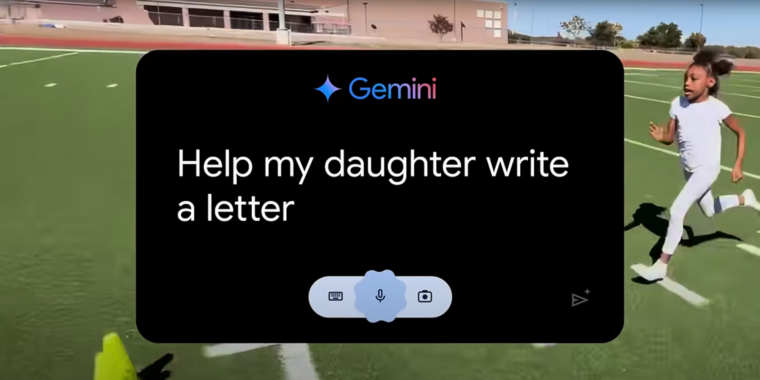If you’ve watched any Olympics coverage this week, you’ve likely been confronted with an ad for Google’s Gemini AI called “Dear Sydney.” In it, a proud father seeks help writing a letter on behalf of his daughter, who is an aspiring runner and superfan of world-record-holding hurdler Sydney McLaughlin-Levrone.
“I’m pretty good with words, but this has to be just right,” the father intones before asking Gemini to “Help my daughter write a letter telling Sydney how inspiring she is…” Gemini dutifully responds with a draft letter in which the LLM tells the runner, on behalf of the daughter, that she wants to be “just like you.”
I think the most offensive thing about the ad is what it implies about the kinds of human tasks Google sees AI replacing. Rather than using LLMs to automate tedious busywork or difficult research questions, “Dear Sydney” presents a world where Gemini can help us offload a heartwarming shared moment of connection with our children.
Inserting Gemini into a child’s heartfelt request for parental help makes it seem like the parent in question is offloading their responsibilities to a computer in the coldest, most sterile way possible. More than that, it comes across as an attempt to avoid an opportunity to bond with a child over a shared interest in a creative way.



Yeah I agree if you send it without doing any kind of personalisation. I think LLM shine as a template or starting point for various things. From there it’s up to the user to actually make it theirs.
exactly… AI used as a template factory would be good use.
The problem here (with the commercial in question) is that they present it as Gemini being able to write a proper fan letter that is not even prompted by the fan (it’s the dad for some reason)… THAT is what makes it incredibly cringey
And to state the obvious; of course it would be helpful for anyone with a learning or speech disability, nobody in their right mind would complain about a “wheelchair doing all the work” for a person who cannot walk.